42 the age structure diagram for rapidly growing populations
How does the shape of age pyramid reflect the growth ... A population pyramid graphically displays the age and gender make-up of a population. As we explained in our post 'What is a Population Pyramid,' the more rectangular the graph is shaped, the slower a population is growing; the more a graph looks like a pyramid, the faster that population is growing. Characteristics of Population (Explained With Diagram) These categories, proposed by Bodenheimer (1985), have considerable value in visualizing the status of a population. In natural population, the age structure is almost constantly changing. In a rapidly growing or expanding population as in the case of bacteria, yeast and housefly, birth rate is high and population growth may be exponential.
Population pyramid - Wikipedia A population pyramid (age structure diagram) or "age-sex pyramid" is a graphical illustration of the distribution of a population (typically that of a country or region of the world) by age groups and sex; it typically takes the shape of a pyramid when the population is growing. Males are usually shown on the left and females on the right, and they may be measured in absolute numbers or as a ...

The age structure diagram for rapidly growing populations
Quaternary extinction - Wikipedia The Quaternary period (from 2.588 ± 0.005 million years ago to the present) has seen the extinctions of numerous predominantly megafaunal species, which have resulted in a collapse in faunal density and diversity and the extinction of key ecological strata across the globe. The most prominent event in the Late Pleistocene is differentiated from previous Quaternary pulse … Which best describes an age structure diagram of a rapidly ... An age structure diagram shows the distribution of various age groups in a population of a country. It can be used to predict how the population size will change over time. Which best describes an age structure diagram of a rapidly increasing population? A A rectangular shaped diagram that has an equal distribution of males and females at all ages. Age Structure, Population Growth, and Economic Development ... Stable population diagrams are rounded on the top, showing that the number of individuals per age group decreases gradually, and then increases for the older part of the population. Age structure diagrams for rapidly growing, slow growing, and stable populations are shown in stages 1 through 3.
The age structure diagram for rapidly growing populations. Biology Chapter 5 Flashcards - Quizlet PLAY. If the major food source of the seals declines due to pollution or overfishing, which of the following would likely occur? Stage 4 represents a population that is decreasing. Age structure diagrams for rapidly growing, slow growing, and stable populations are shown in stages 1 through 3. Figure 19.11 Age structure diagrams for rapidly growing ... Science Biology Concepts of Biology Figure 19.11 Age structure diagrams for rapidly growing, slow growing, and stable populations are shown in stages 1 through 3. What type of population change do you think stage 4 represents? As World’s Population Booms, Will Its Resources Be Enough ... 21-09-2014 · As climate change damages crop yields and extreme weather disrupts harvests, growing enough food for our expanding population has become what The 2014 World Food Prize Symposium calls "the ... Unit 3: Age Structure Diagrams Flashcards - Quizlet a rapidly growing population, as a rule, will have a higher proportion of younger people compared to stable or declinging populations stable population growth a population is stable when the age-structure diagram is more triangular, meaning each age group has slightly less than the younger age group declining population growth
Malthusianism - Wikipedia Malthus' theoretical argument. In 1798, Thomas Malthus proposed his theory in An Essay on the Principle of Population. He argued that society has a natural propensity to increase its population, a propensity that causes population growth to be the best measure of the happiness of a people: "The happiness of a country does not depend, absolutely, upon its poverty, or its riches, upon its youth ... Science Chapter 8 Flashcards | Quizlet answer: a rapidly growing population age structure diagram might look like a pyramid. What might the age structure diagram of a rapidly growing population look like? ANSWER:MORE MALES ARE BORN THAN FEMALES; WHICH IS WHY THERE IS MORE MEN. How do Organisms Reproduce Class 10 Important Questions ... Diagram for regeneration in planaria. The process of getting back a full organism from its body parts is called regeneration. The simple animals like hydra and planaria show regeneration. Explanation: If the body of planaria gets cut into a number of pieces, then each body piece can regenerate into a complete planaria by growing all the missing ... Victorian era - Wikipedia In the strictest sense, the Victorian era covers the duration of Victoria's reign as Queen of the United Kingdom of Great Britain and Ireland, from her accession on 20 June 1837—after the death of her uncle, William IV—until her death on 22 …
Human Population Growth | OpenStax Biology 2e - Lumen ... Stable population diagrams are rounded on the top, showing that the number of individuals per age group decreases gradually, and then increases for the older part of the population. Age structure diagrams for rapidly growing, slow growing, and stable populations are shown in stages 1 through 3. ch. 14 quiz Flashcards | Quizlet A rapidly growing population is likely to have an age-structure diagram that is A) bullet-shaped. B) in the shape of an inverted pyramid. C) shows significant bulges in the middle of the diagram. D) constantly changing its shape. E) in the form of a pyramid. Glutamate Receptor Ion Channels: Structure, Regulation ... The structure of a membrane-spanning tetrameric glutamate receptor has been described, revealing unprecedented features of channel structure together with long-awaited details on the pore-forming elements and the channel gate, subunit arrangement, and the nature of linkers connecting multiple semiautonomous domains that comprise the extracellular portion of the … Top 6 Characteristics of Population - Biology Discussion ADVERTISEMENTS: Some of the most important characteristics of population are as follows: 1. Population density 2. Natality 3. Mortality 4. Population growth 5. Age distribution of population 6. Population fluctuations. 1. Population Density: Population density refers to the size of any population in relation to some unit of space. It is expressed in terms of […]
Population: Age Structure - Kennesaw State University population, it is easy to construct an age structure diagram. Once the diagram is constructed, one can clearly see if the population will grow, decline, or experience no noticeable change in its population numbers; for example, if the diagram shows a pyramidal shape, then one can expect a rapid rise in population.
Age Structure, Population Growth, and Economic Development Fast-growing populations with a high proportion of young people have a triangle-shaped age structure, representing younger ages at the bottom ...14 Aug 2020 · Uploaded by Population Reference Bureau
Solved: Figure 19.11 Age structure diagrams for rapidly ... Alternate ISBN: 9781630180911, 9781947172036. Concepts of Biology (1st Edition) Edit edition Solutions for Chapter 19 Problem 3ACQ: Figure 19.11 Age structure diagrams for rapidly growing, slow growing, and stable populations are shown in stages 1 through 3. What type of population change do you think stage 4 represents? ….
Seed - Wikipedia Seed production in natural plant populations varies widely from year to year in response to weather variables, insects and diseases, and internal cycles within the plants themselves. Over a 20-year period, for example, forests composed of loblolly pine and shortleaf pine produced from 0 to nearly 5 million sound pine seeds per hectare.
How Reproductive Age-Groups Impact Age Structure Diagrams ... The age structure diagrams below have been color coded to show the three reproductive categories. Example of an age structure with an expanding population Population growth occurs when the segment of the population currently in its childbearing years has produced a generation larger than itself.
Environmental Science Chapter 8 Study Guide ... - Quizlet What might the age structure diagram of a rapidly growing population look like? Many individuals of reproductive age and large number of children Which is not a reason why replacement fertility must be higher than 2.0 for a nation to maintain a stable population size?
Age Structure - Our World in Data These are the question that this entry focuses on. The global median age has increased from 21.5 years in 1970 to over 30 years in 2019. The global population breakdown by age shows that a quarter (26%) are younger than 14 years, 8% are older than 65, while half of the world population is the working age bracket between 25 and 65.
Human Population Growth | Biology II - Lumen Learning Countries with rapid growth have a pyramidal shape in their age structure diagrams, showing a preponderance of younger individuals, many of whom are of reproductive age or will be soon. This pattern is most often observed in underdeveloped countries where individuals do not live to old age because of less-than-optimal living conditions.
Human Population Growth | Boundless Biology Population bar graphs for stages of demographic change from expansion to contraction: The leftmost diagram (representing the age structure of a rapidly-growing population) indicates that the number of individuals decreases rapidly with age. The slow-growth model shows that the proportion of individuals decreases steadily with age.
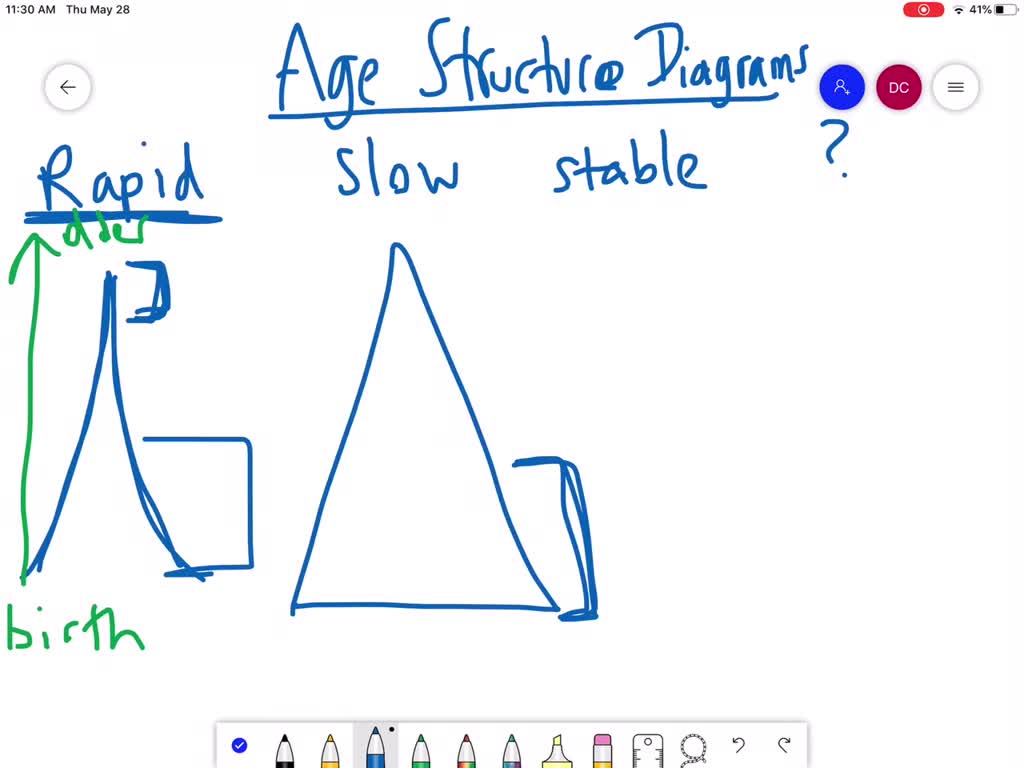
figure 1911 age structure diagrams for rapidly growing slow growing and stable populations are shown 73147
-3 How Does a Population's Age Structure Affect Its Growth or ... Figure 6-11 presents generalized age-structure diagrams for countries with rapid, slow, zero, and negative population growth rates. A country with a large percentage of its people younger than age 15 (represented by a wide base in Pig ure 6-11, far left) will experience rapid population growth unless death rates rise sharply.
Chapter 7 Flashcards - Quizlet If a population's age structure diagram looks like a pyramid, the population is expanding. The birth rate of a population is expressed as a percentage Use Figure 7-1. Population A is most likely rapidly growing
SARS-CoV-2: from its discovery to genome structure ... 19-07-2021 · SARS-CoV-2 genome structure and expression. Like other hCoVs, SARS-CoV-2 has a single-stranded, positive-sense RNA (+RNA) genome of 29,882 [], 29,891 [] or 29,903 nucleotides (nts) [].The genome is packed by viral nucleocapsid (N) proteins as a large ribonucleoprotein (RNP) complex and enclosed by an envelope membrane with lipids and viral …
reading quiz 45 Flashcards | Quizlet Figure Age structure diagrams for rapidly growing, slow growing and stable populations are shown in stages 1 through 3. ... Rapidly growing countries have a large segment of the population at a reproductive age or younger. Slower growing populations have a lower percentage of these individuals, and countries with zero population growth have an ...
The age structure diagram for rapidly growing populations a ...
Age Structure, Population Growth, and Economic Development ... Stable population diagrams are rounded on the top, showing that the number of individuals per age group decreases gradually, and then increases for the older part of the population. Age structure diagrams for rapidly growing, slow growing, and stable populations are shown in stages 1 through 3.
Which best describes an age structure diagram of a rapidly ... An age structure diagram shows the distribution of various age groups in a population of a country. It can be used to predict how the population size will change over time. Which best describes an age structure diagram of a rapidly increasing population? A A rectangular shaped diagram that has an equal distribution of males and females at all ages.
Quaternary extinction - Wikipedia The Quaternary period (from 2.588 ± 0.005 million years ago to the present) has seen the extinctions of numerous predominantly megafaunal species, which have resulted in a collapse in faunal density and diversity and the extinction of key ecological strata across the globe. The most prominent event in the Late Pleistocene is differentiated from previous Quaternary pulse …
.png?revision=1&size=bestfit&width=1163&height=307)


/united-states-population-pyramid-2014-58b879c43df78c353cbc66fc.jpg)

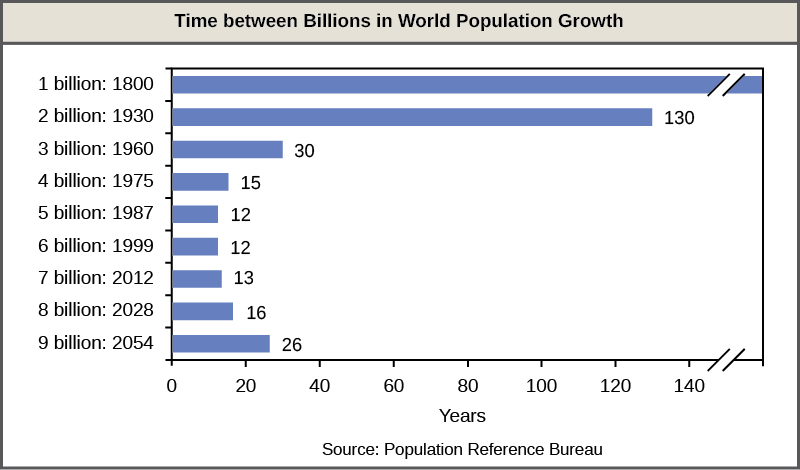


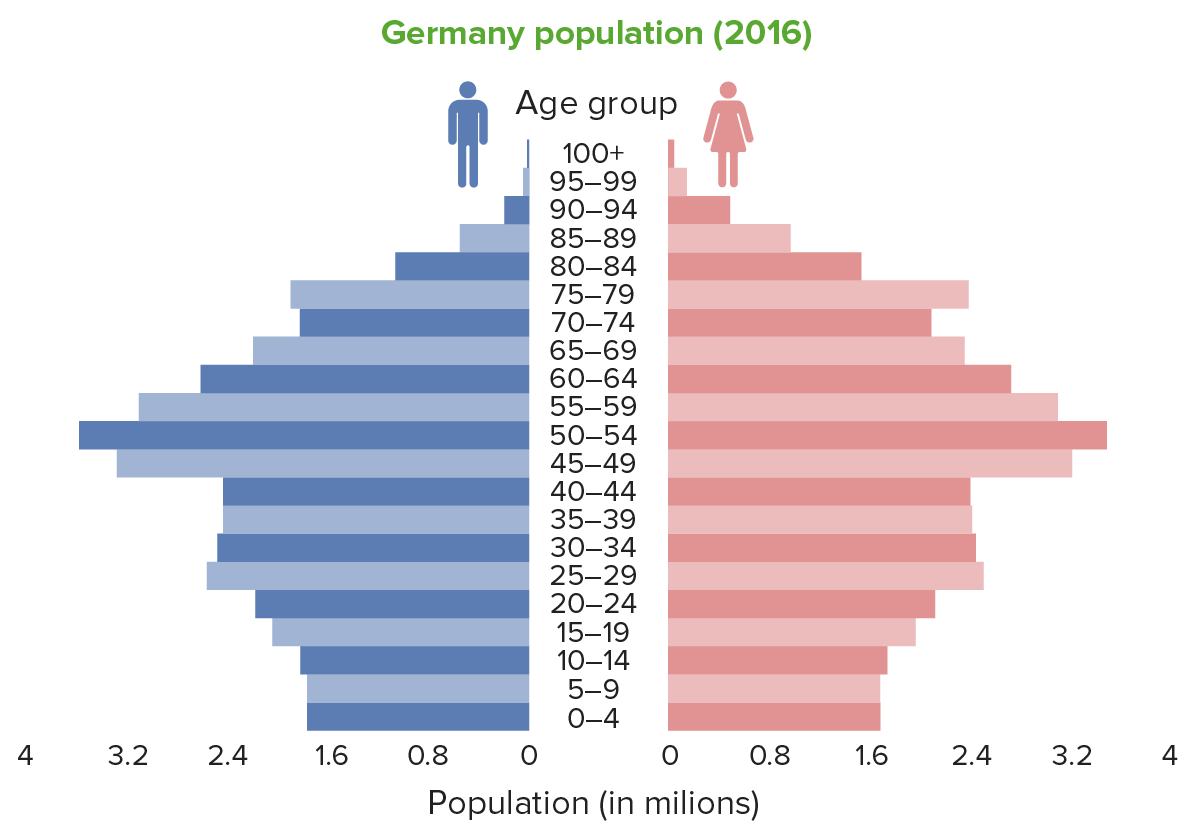



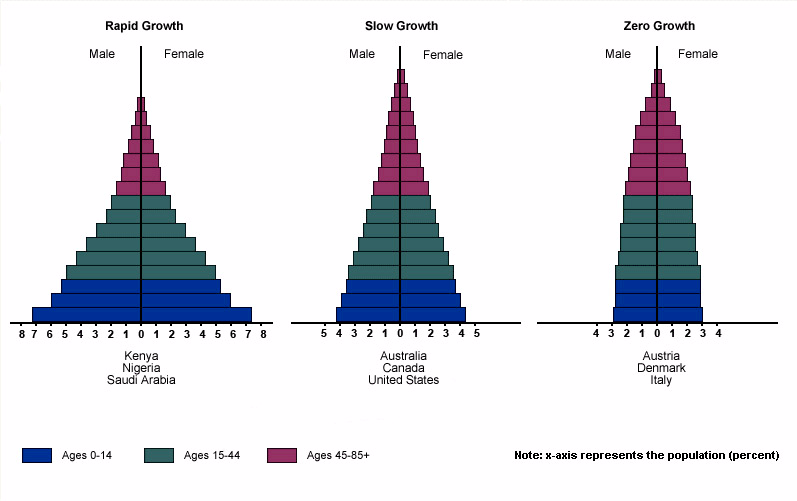

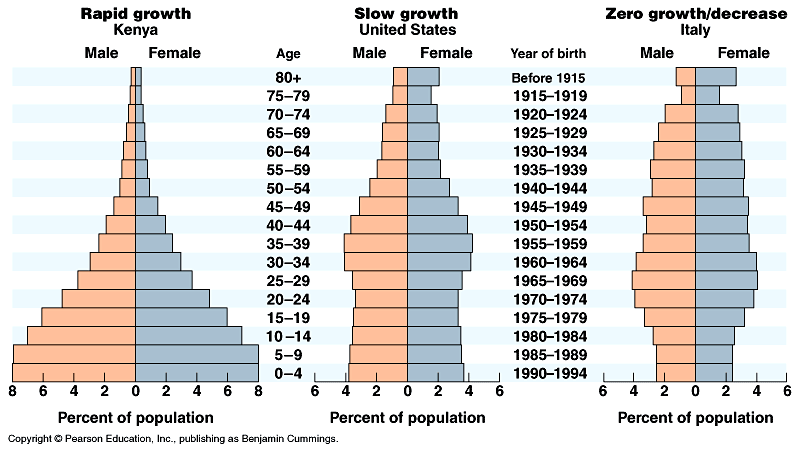


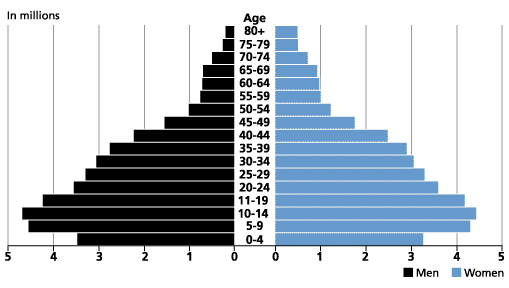
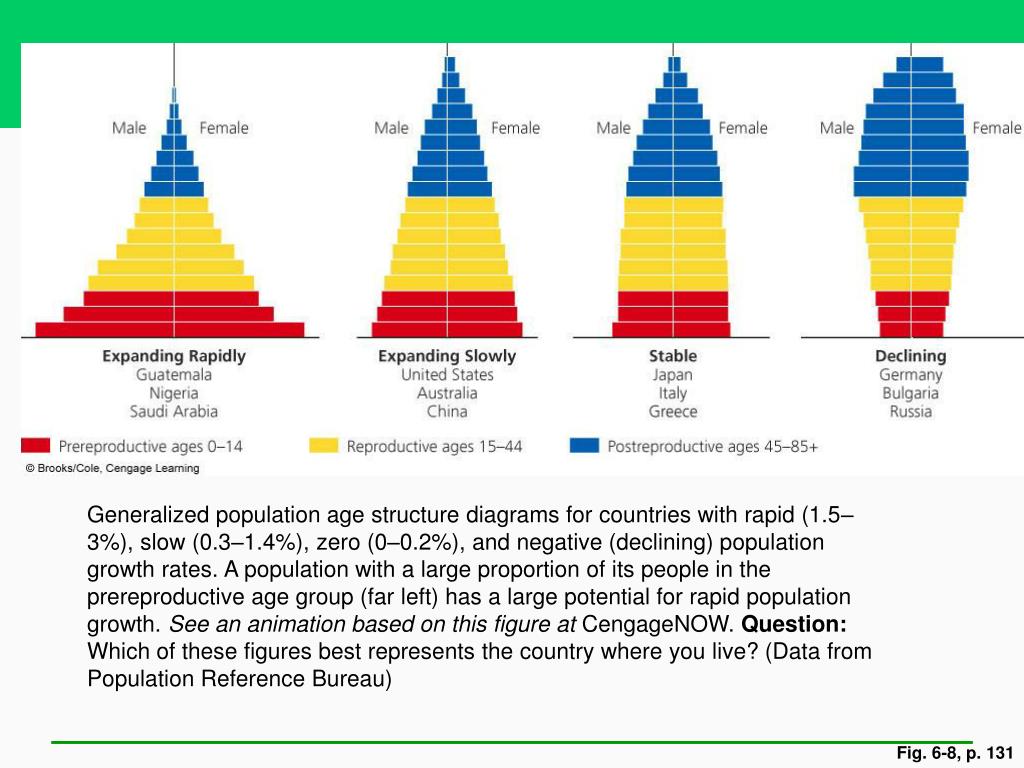

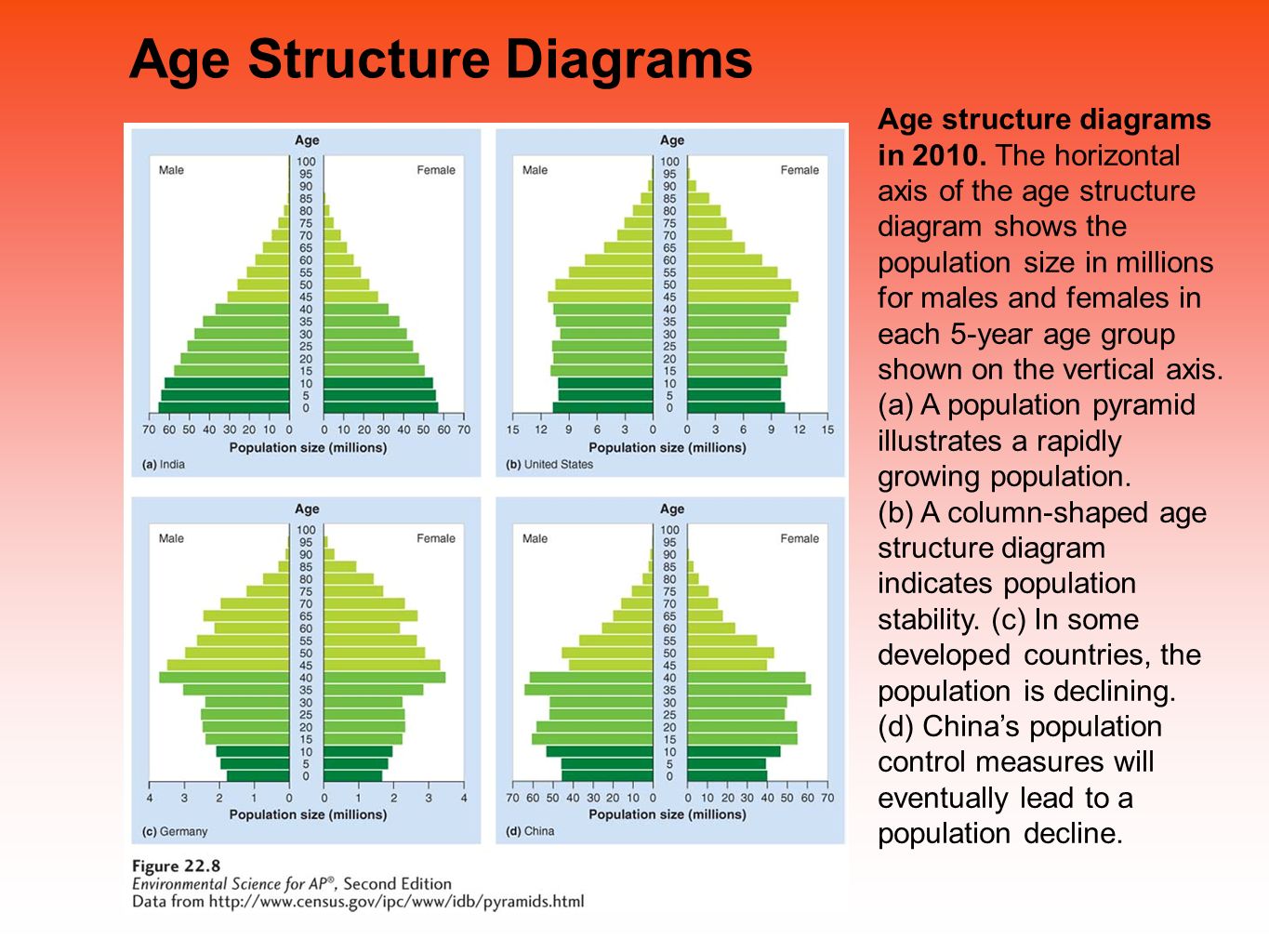
:max_bytes(150000):strip_icc()/united-states-population-pyramid-2014-58b879c43df78c353cbc66fc.jpg)
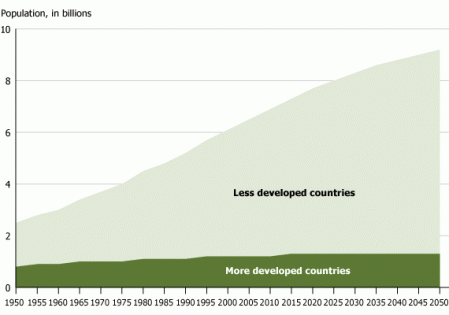






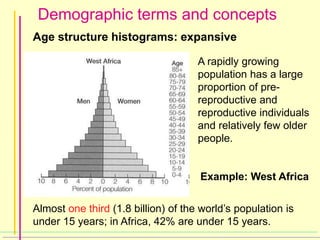
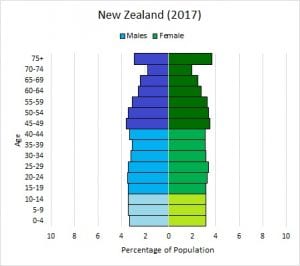

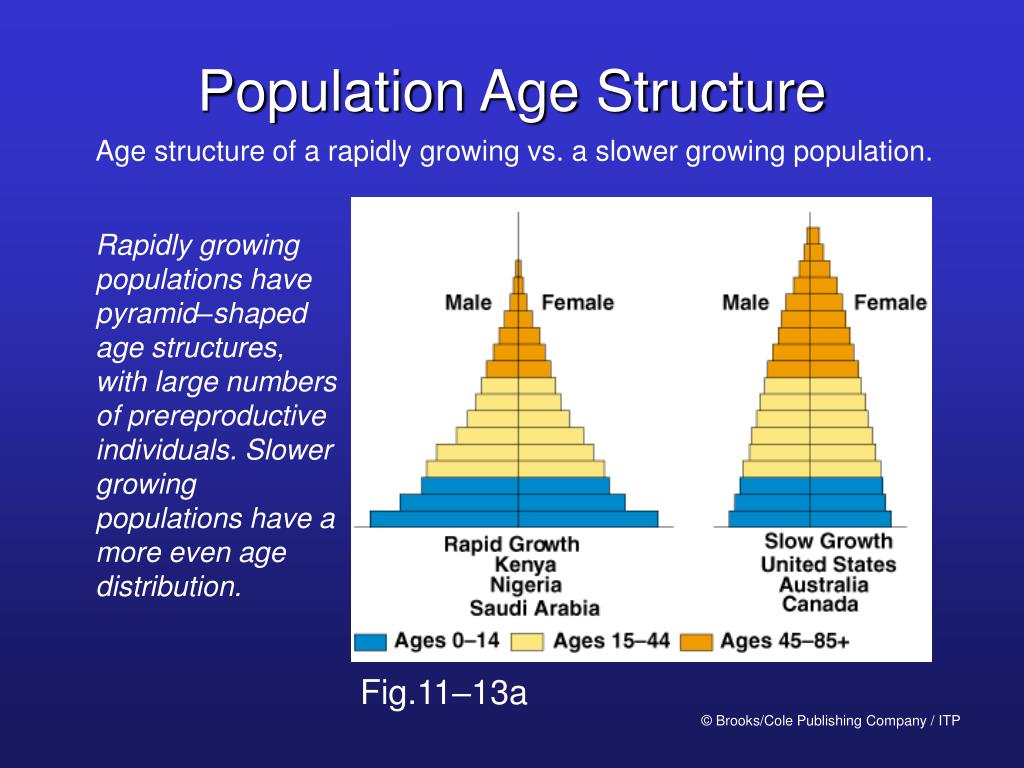

0 Response to "42 the age structure diagram for rapidly growing populations"
Post a Comment